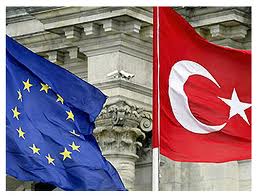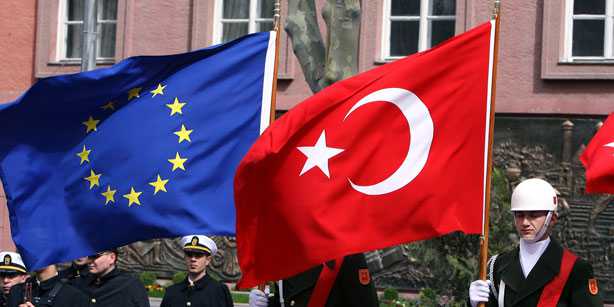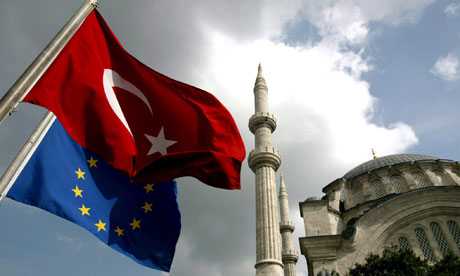Published: Thursday 8 October 2009
French colleagues have promised never to use the insulting phrase ‘privileged partnership’ again as Ankara negotiates full EU membership, the minister of European affairs and Turkey’s chief negotiator, Egemen Bagiş, told EurActiv in an exclusive interview.
Egemen Bagiş was until recently the vice-chairman of the ruling AKP party, a member of parliament and a promoter of the election of Istanbul as 2010’s European cultural capital.
He was speaking to EurActiv’s Georgi Gotev.
To read a shortened version of this interview, please click here.
A number of chapters in Turkey’s negotiations are blocked, mainly over the Cyprus issue, if my information is correct. Who blocked those chapters and why?
[Laughter] It’s as complicated as who killed Jesus […] I think that the most important thing that we should focus is that that the most difficult part of the negotiations is behind us. And the most difficult part has been putting the Turkey train on the EU tracks. The most difficult part was starting the accession talks. Every country that has ever stated accession negotiations has at the end completed them. Turkey will not be an exception.
It took us 40 years just to get a date to start accession talks. We did not give up. We were committed, we were decided, and we were patient. And today, we are even more committed, more decided and more patient than ever.
Which was the major turning point? Was it the December 1999 Helsinki summit, when Turkey became a candidate country?
I think the greatest moment was 17 December 2004, when after major debate, even walking out of the room, we were convinced by [Dutch Prime Minister Jan Peter] Balkenende and the Dutch presidency to come back to the Council meeting, where we were told that the negotiations would start as of 3 October 2005.
What was the compromise? What made you return to the meeting room?
It was the Ankara Protocol issue – Cyprus [a decision from 2004 that Turkey should open its ports to Cyprus]. Turkey made a promise to open its ports, in exchange for ending the isolation for the Turkish Cypriots. We are behind our promise. If EU countries decide to have direct trade with Northern Cyprus, we will be more than happy to open our ports, and keep our part of the promise. The Greek Cypriots purchase the products of Northern Cyprus through the Green-line protocol of the UN, but they do not want 26 other EU members to do what they are doing themselves. We think EU is based on equality. And if one member country can enjoy the products of a third country, the other 26 should also be able to enjoy them.
But no one except Turkey recognises Northern Cyprus as a country…
By trading with Northern Cyprus they would not be recognising the state. Just like we all trade with Taiwan, but we don’t recognise Taiwan diplomatically.
Who should now make a move to unblock the situation? Do you expect the Swedes to help you to find a way out, as Balkenende did in 2004?
I don’t think we need someone to interfere, beacause the two leaders, [Turkish community] President Talat and [Cypriot] President Christofias have met 42 times this year alone. And they are already rolling the ball. And I’m very hopeful they will come to a conclusion of these talks in a positive manner, and they will announce to the world that they have come to an understanding together.
So the key for unlocking Turkey’s EU accession talks is the Cyprus reunification talks?
The Cyprus talks are very important, but the Cyprus problem was not a prerequisite for the membership of Cyprus itself. Therefore it should not be a prerequisite for the membership of another country.
Do you think the Union made a compromise by allowing Cyprus in the EU without its problems with Turkey being solved?
I’m not in a position to make a judgement on that. But I know some European leaders who have said publicly, including [German] Chancellor Merkel, that including Cyprus before a solution was a big mistake.
But this is not in your favour. Merkel probably means that the negotiations with Turkey should not have stated. Isn’t the situation with Ms. Merkel now more complicated for you?
No. 17% of all foreign investment in Turkey is German. There are three million Turks that live in Germany. 1.2 million of them are citizens of that great country. Germany and Turkey enjoy a very strong relationship. We may sometimes differ on issues, but we are allies, we are partners, we are friends and the relationship between the two countries is very solid. In every relationship, you have good days and better days. But Turkey and Germany can easily handle differences of views.
Coming back to Cyprus, do you think President Christofias wants a quick solution, or do you think he is buying time? How would you read his tactics?
The Cyprus issue is portrayed as a problem in EU-Turkey relations. But I think the Cyprus issue is an issue on its own.
But yourself you explained that it has implications.
Well, Cyprus is one of the 27 countries.
Who is blocking Turkey’s negotiating chapters?
Well, there are five chapters blocked by France, there are three by Austria and Germany, there are eight because of the Ankara Protocol, but it’s a Council decision, it’s not Cyprus. Cyprus is trying to prevent the opening of two chapters, education and energy. But I think these problems can be overcome.
In what timeframe?
It depends on the talks between Presidents Talat and Christofias. Hopefully by February they will come to an understanding that both sides can accept, and I can assure you, that any solution that is accepted by the Turkish Cypriots and Greek Cypriots will have the full support of the Turkish nation. As long as the two communities on the island agree, we will back the agreement.
You are well informed about the Cyprus talks. You even appear to know when they will end. How do you keep contact with Mr. Talat? Does he report to you?
No, no. He’s the president of a sovereign democracy. He was elected into office by his own people, and he will face elections in April when his people will decide to keep him in office or not. He only reports to his own people. But as a very close ally, of course, we exchange information.
Do you think that Nicosia fears that most EU money for Cyprus would flow to the North?
I think Nicosia has a problem identifying the carrots and the sticks for a solution or lack of a solution. I think the world has to put more pressure to the island, on both sides, to speed up the process and come to a comprehensive solution.
Regarding the Turkey-EU talks, apart from the blocked chapter, your country has to deliver on the Union’s requirements as any other candidate country. Do you think that your country can deliver as well as the countries from the 2004 and 2007 enlargements?
I think that Turkey is more capable than many other countries in those issues. We have already fulfilled most of the Maastricht criteria, although we didn’t have to. When banks went bankrupt throughout Europe in 2008, not a single Turkish bank lost money. The only facilities of French automaker Renault that profited in 2008 were the ones in Romania and in Turkey. Turkey is a very young, dynamic nation. We have the fourth largest workforce in Europe. The medium age in Turkey is 28. Half of our nation of 70 million is below the age of 25. And we have come a long way in the last 10 years. Ten years ago we were the 27th largest economy in the world, today we are the 16th.
We have a case – we can become one of the top economies and top countries of the world, even without becoming a member of the EU. So EU membership is very important anchor, but it’s not our only option.
But this is precisely the message Mr. Sarkozy will be delighted to hear. As you say membership is not the only option, he is proposing a privileged partnership…
I said the EU is not the only option. I didn’t say full membership is not the only option. Turkey will only accept full membership, nothing less, nothing more. But Europe is not our only option. But if we chose plan A, we chose full membership. I checked the 100.000-page acquis, there’s nothing besides membership. There is no alternative to membership. It doesn’t exist. What President Sarkozy used to say, and what his colleagues promised me not to use those insulting, those horrible phrases again, does not exist. What insulting phrases? Privileged partnership.
Is it insulting?
Very insulting. Because it does not exist. There is no legal foundation for it.
But you may find Mr. Sarkozy even more reluctant after these statements.
Well, he will be hosting our president tonight (7 October) and I will be going from here to Paris today to meet with them. But I was there two weeks ago. And they realised that these phrases are insulting.
You spoke about the Maastricht criteria. What about the Copenhagen criteria?
The fulfilling of the critical mass for the Copenhagen criteria was a prerequisite to start accession talks. So we have met that critical mass.
But there is more.
We are working on it. That’s why we established the male-female gender equality committee in parliament, that’s why we announced 1 May as a national holiday, that’s why we have allocated more than 500 million euros to the South East Anatolia project, that’s why we have changed the criminal code to allow members of the military to be prosecuted in civilian courts, that’s why we have prepared a reform strategy for the judicial branch, that’s why we have announced an anti-corruption strategy document, that’s why the prime minister has had meetings with leaders of minority groups in Turkey…
But those efforts, also with respect to relations with Armenia, or with respect to the Kurdish minority: could they destabilise the country if they are not heeded by society and major political players?
Turkey is a democracy. People have the right to approve and to criticise the actions of the government.
I’m refereeing to the military establishment.
Believe me, there are political parties who are much more interested in criticising these initiatives than some of the institutions in Turkey. The military support Turkey’s EU ambitions, because the EU goal ensures keeping the direction that Ataturk, the founder of the Turkish republic, gave to Turks, which is to catch up with the Western civilian status. The EU is the most important contemporary civilisation level. And as we are continuing our reforms, we are ensuring that Turkey is becoming a better place to live in. A stronger and more stable ally for our European partners as well.
When does Turkey aspire to become an EU member? What date do you have in mind?
I am against giving dates. As I already said, we are a very patient nation. It took us 45 years to start negotiations.
Can you wait another 45 years?
I don’t think we can wait for another 45 years. I think the EU itself is a political union and it’s a political process, just as 18 million Eastern Germans became EU citizens overnight, without going to any negotiation, because there was a political need. The time will come for that great rendez-vous when 70 million Turks will become equal citizens of the EU. We just have to be prepared for that great rendez-vous. And that’s what I’m trying to do in my country – to increase the speed of the reforms, to make Turkey a better place for ourselves, and a ready place for our friends and allies in Europe.
If somebody says 2020 – is that a good proposal or a bad proposal?
I have to analyse the dynamics. I cannot say if it’s good or bad. It depends what’s attached to it.
But you didn’t say it’s a bad proposal?
I didn’t say it’s good either.






